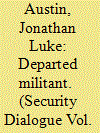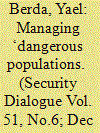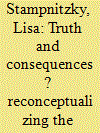| Srl | Item |
| 1 |
ID:
175367


|
|
|
|
|
| Summary/Abstract |
This is an essay about the personhood of militant violence, the phenomenological underpinnings of political evil and the friendship between two men. It begins by recounting the author’s street-side meeting with several Islamist militants in Tripoli, Lebanon, one of whom later described his preparations to become a ‘martyr’ in Syria. The essay takes my conversations with this man and his friends as a means of exploring the becoming of violent militancy as a fundamentally creative and essentially joyful series of encounters that lead to the emergence of extreme violence. To do so, I read the narrative account at the centre of the essay through the concept of social and political ‘fracturing’, which is described as the process through which individuals or groups are able to transcend traditional limits on knowledge, action and belief. This discussion of social and political fracturing is then brought into conversation with the question of what constitutes social or political evil in order to demonstrate that debates over what produces violent militant mobilization have generally missed the crucial relevance of a set of small, intimate and embodied rituals that suffuse evil, violence and war-fighting more generally with a fundamentally positive (yet eventually destructive) phenomenology.
|
|
|
|
|
|
|
|
|
|
|
|
|
|
|
|
| 2 |
ID:
175368


|
|
|
|
|
| Summary/Abstract |
This article traces the historical foundations of current security legislation as the matrix of citizenship. Examining Israel’s new Counter-Terrorism Law against the backdrop of security legislation in India, its main proposition is that these laws and their effects are rooted in colonial emergency regulations and the bureaucratic mechanisms for population control developed therein, rather than in the ‘global war on terror’. The article offers an organizational vantage point from which to understand the development of population-classification practices in terms of an ‘axis of suspicion’ that conflates ‘political risk’ with ‘security risk’. Through an account of the formalization of emergency laws, it explains the effects of colonial bureaucracies of security upon independent regimes seeking legitimacy as new democracies by tracing decisions regarding the use of an inherited arsenal of colonial and settler-colonial practices of security laws for population management, particularly mobility restrictions, surveillance and political control. One of the most important of these effects is the shaping of the citizenship of targeted populations by security laws.
|
|
|
|
|
|
|
|
|
|
|
|
|
|
|
|
| 3 |
ID:
175369


|
|
|
|
|
| Summary/Abstract |
This article provides a re-theorization of the Prevent strategy as racialized bordering. It explores how knowledge regarding the racist logics of British counter-terrorism are supressed through structures of white ignorance and how International Relations scholarship is implicated in this tendency to ‘whitewash’ Prevent’s racism. Building on the use of science fiction in International Relations, the article uses China Miéville’s novel The City and the City to undertake the analysis. Miéville evokes a world where the cities of Ul Qoma and Besźel occupy the same physical space but are distinct sovereign jurisdictions. Citizens are disciplined to ‘see’ their city and ‘unsee’ the other city to produce borders between the two. The themes of coding signifiers of difference and seeing/unseeing as bordering practices are used to explore how Prevent racializes Muslims as outsiders to a white Britain in need of defending. Muslim difference is hypervisibilized or seen as potentially threatening and coded as part of racialized symptoms which constitute radicalization and extremism. This article shows how the racial bordering of Prevent sustains violence perpetrated by white supremacists, which is subsequently ‘unseen’ through the case of Thomas Mair.
|
|
|
|
|
|
|
|
|
|
|
|
|
|
|
|
| 4 |
ID:
175370


|
|
|
|
|
| Summary/Abstract |
Secrecy, especially state secrecy, has taken on increasing interest for scholars of international relations and security studies. However, even with interest in secrecy on the rise, there has been little explicit attention paid to exposure. The breaking of secrecy has generally been relegated to the role of a mere ‘switch’, whose internal workings and variations are of little consequence. This article argues that exposure is a significant process in its own right, and introduces a new conceptualization of exposure as a socially and politically constructed process, one that must be ‘thickly described’ if we are to understand how it occurs and has effects. I differentiate the process of exposure into two distinct aspects, reserving the concept of exposure to refer to releases of information, while introducing the concept of revelation to refer to a collective recognition that something has been exposed. The first part of the article explores existing understandings of secrecy and exposure to demonstrate why a new framework is needed, while the second part applies this framework to a case study of the exposure of the use of torture in the post-9/11 US ‘war on terror’.
|
|
|
|
|
|
|
|
|
|
|
|
|
|
|
|
| 5 |
ID:
175366


|
|
|
|
|
| Summary/Abstract |
Conceptualizations of post-conflict agency have been widely debated in feminist security studies and critical international relations studies. This article distinguishes between three feminist approaches to post-conflict agency: narrative of return, representations of agency and local agency. It argues that all these approaches in distinct ways emphasize a modality of agency as resistance. To offer a more encompassing account of post-conflict agency the article engages Saba Mahmood’s (2012) critique of the modality of agency in feminist theory and her decoupling of agency from resistance. The article explores experiences of women who fought in the People’s Liberation Army (PLA) in Nepal. It focuses on ‘withdrawing from politics’, a dynamic whereby women ex-fighters move away from party activities and the public sphere, and rearticulates this withdrawing as a location of political agency. The article argues that being an ‘ex-PLA’ emerges as a form of subjectivity that is crafted through experiencing war and encountering peacebuilding, enabling a production of heterogeneous modalities of agency in the post-conflict context. By examining these modalities, the article challenges us to rethink post-conflict agency beyond the capacity to subvert regulatory gender norms and/or discourses of liberal peace.
|
|
|
|
|
|
|
|
|
|
|
|
|
|
|
|